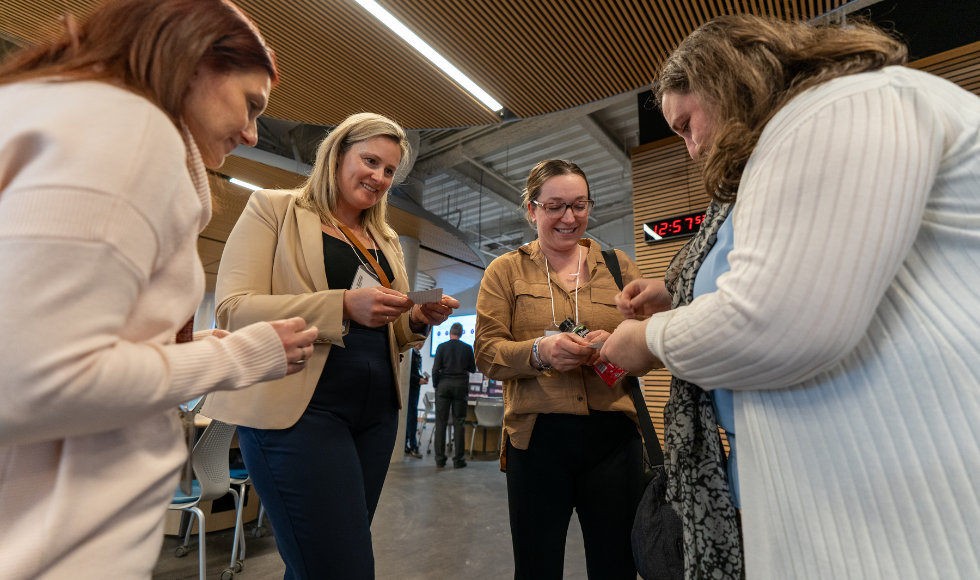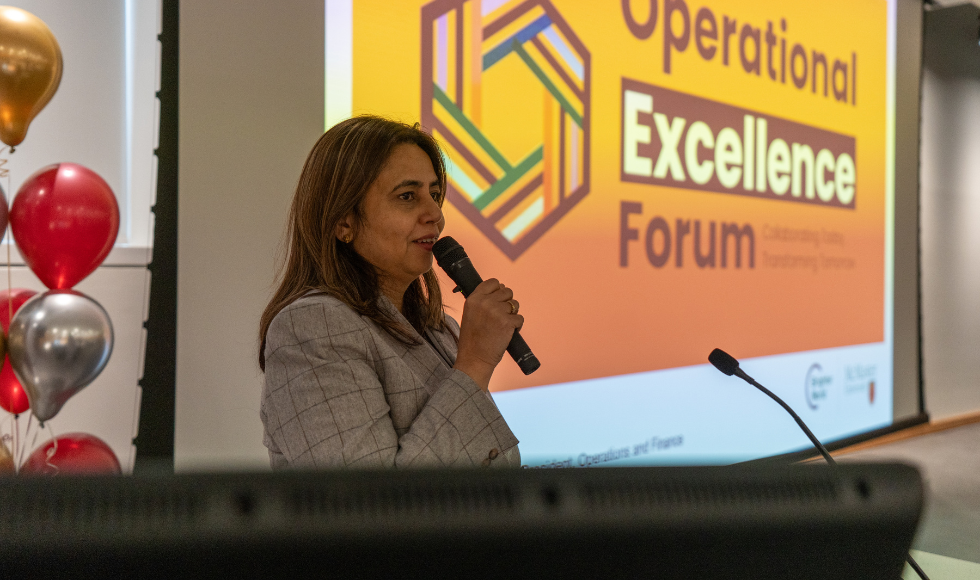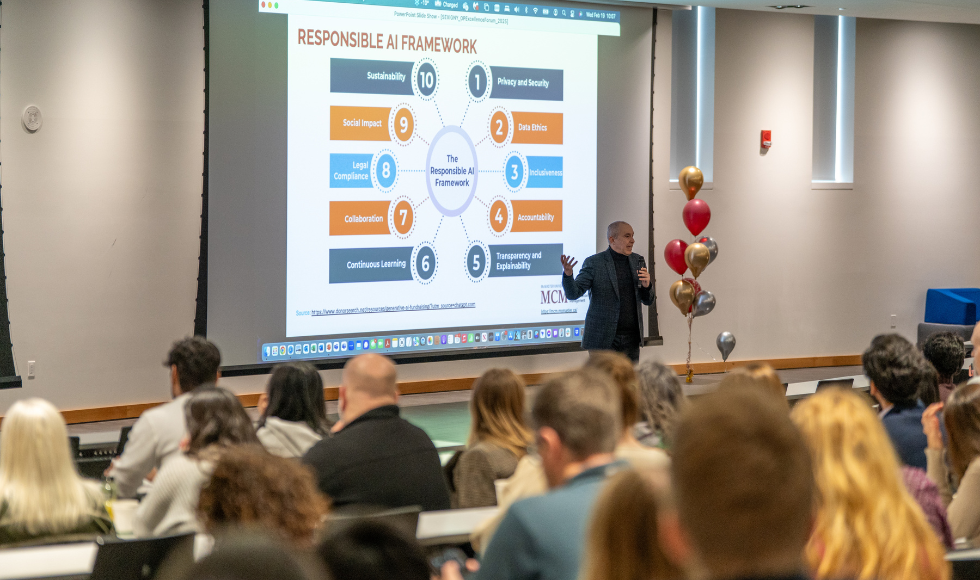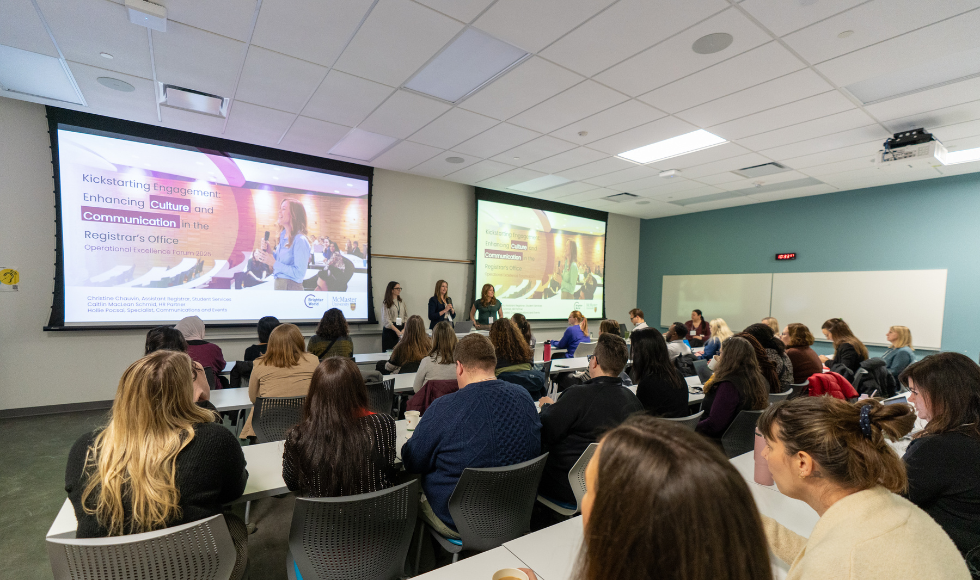Setting the stage for continued success: Highlights from the Operational Excellence Forum

The inaugural Operational Excellence Forum, held on February 19 in the Peter George Centre for Living and Learning, offered attendees from across the university the chance to network, learn from colleagues and find ways to collaborate. (All photos by Georgia Kirkos/McMaster University).
This month, hundreds of staff members from across McMaster got together to learn from one another and find areas for collaboration — setting the stage for the continued success of the operations of the university.
The inaugural Operational Excellence Forum, a day-long event held in the Peter George Centre for Living and Learning, featured over a dozen workshops, panels and demonstrations from areas across McMaster, and provided an opportunity for attendees to network, brainstorm and find areas to work together.

Gathering as one university to find ways to support operational excellence is of timely importance given the financial pressures Ontario universities are facing, said Saher Fazilat, vice-president (Operations and Finance).
The forum, designed to foster collaboration and the sharing of ideas, is another step on the path of responsible financial stewardship for the university, Fazilat said.
“We need to work collectively to remain where we are, finding opportunities for continuous improvement in a revenue declining environment.”
She noted the incredible response to the inaugural event, which featured representatives from across McMaster sharing ideas around cost efficiencies, sustainability, inclusivity, project management, workflow automation and productivity tools.

Alex Sévigny, an associate professor in the department of Communication & Media Arts, delivered a keynote address on the rapidly changing landscape around artificial intelligence, projections for its growth and the ways we can adopt a future-focused mindset around its use to ensure success ahead.
“Think of AI as something that amplifies the work you do and enhances your offerings,” advised Sévigny.
In one of the 16 workshops offered throughout the day, staff from Human Resources Services, the Lewis & Ruth Sherman Centre for Digital Scholarship, the MacPherson Institute and the Privacy Office shared insights from the work and exploratory projects their teams have done in incorporating generative AI operational capabilities into their work.
They also offered advice for those looking to get started with AI — from reading the Guidelines on the Use of Generative AI in Teaching and Learning to incorporating AI-related workflows into one’s personal development goals.
“Curiosity is key,” offered Kat Williams, the communications and projects lead for the Digital Research Commons Pilot.
“There is an element of just having to put your feet in the water to get started with AI.”
Essential resources like the Digital Capability Learning Hub, the Introduction to Generative AI for Staff module and Generative AI for Staff were also shared for those looking to explore the application of AI to their work.

During the extended break for lunch, participants had the option of joining further programming:
The Showcasing Excellence room was set up “a bit like a science fair.” More than 20 campus units set up tables and booths to share information on their work and ways to improve sustainability, efficiency and accessibility.
The Inclusion Lounge brought together offices and groups from across campus that work to advance equity, diversity, inclusion and accessibility. These included the Equity and Inclusion Office, the Black, Indigenous and Racialized Staff (BIRS) employee resource group and the EDI committee from University Technology Services, which highlighted Indigenous excellence and shared resources and a guide on developing Land Acknowledgments.
Throughout the day, many attendees set plans for continued work on shared priorities and Fazilat challenged the group to report on their progress in the coming months.
Recordings of the workshops, panels and demonstrations will be made available in the coming weeks for those who weren’t able to attend in person.
Recordings of the panels, demonstrations, and workshops, along with the PowerPoint slides, are now available on the Operational Excellence SharePoint site.

